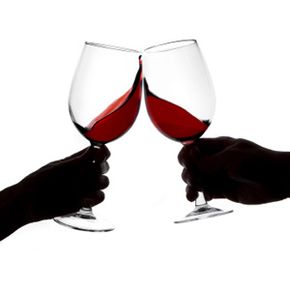If you've ever had a bad hangover, you understand how your senses can work in concert to torment you. Light sensitivity, low tolerance to sound, headache, nausea, a lingering foul taste in your mouth and a general feeling of disorientation can be the unadvertised costs of a lively evening on the town. However, if you're willing to play the odds, there are some ways to overindulge with less risk of paying for it with a nasty hangover. The next time you belly up to the bar, your choice of libation may have an impact on your general well-being the following day.
Understanding Congeners
One of the biggest culprits in feeling awful the morning after binging is a category of substances called congeners, the particulates in spirits that give them their deep color. Congeners are a byproduct of some types of fermentation. Sometimes they're impurities in spirits, and other times they're trace elements added to stabilize or flavor them. These substances vary in different types of alcoholic beverages, but when they get into your system they cause or heighten some of the symptoms associated with hangovers.
Advertisement
One way to reduce your exposure to congeners is to stick with alcoholic beverages that are light in color, such as gin, light rum, vodka or white wine. Another trick is to stick with one type of alcohol. If you start blending dark liquors, such as mixing red wine with brandy, you'll be ingesting different varieties of congeners from both, setting yourself up for a worse hangover than if you'd stuck with only one type of spirit. Some congener-laden spirits to avoid in excess are:
- Brandy
- Red wine
- Bourbon
- Dark rum
- Whiskey
The Biology of a Hangover
Congeners aren't the only things working against you when you drink, so don't think that if you stick to the clear stuff you're OK. Alcohol is a diuretic, which makes your body work hard to conserve water after the binging is over -- this can result in headaches and nausea. Along with all that liquid loss, you also lose important trace chemicals like magnesium and potassium, which will make you feel tired and lethargic.
When your body metabolizes alcohol, it creates a substance called acetaldehyde, which is then broken down by enzymes in your body. After your body runs out of acetaldehyde busters, which it almost certainly will if you've overindulged, acetaldehyde starts to build up, making you feel terrible longer by exacerbating your other symptoms.
There's only one sure way to avoid a hangover, and you probably know what it is: Don't drink alcohol. If you do drink, don't drink in excess and stick with one type of alcohol for the duration. Choose lighter colored drinks, and keep in mind that higher-quality spirits may be a better choice -- less-refined spirits may contain more congeners. If you do overindulge, drink plenty of water and fruit juice to rehydrate. Avoid caffeinated beverages, such coffee and tea, until you're feeling better -- they'll further dehydrate you.
For more information on alcohol and hangovers, see the links on the following page.
Advertisement
